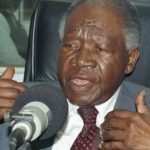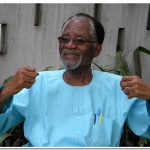Nigeria: A not so happy centenary birthday
Posted by By Akogun Akomolafe at 11 April, at 09 : 42 AM Print

Warning: count(): Parameter must be an array or an object that implements Countable in /home/alaye/public_html/wp-content/themes/Video/single_blog.php on line 56
(Published in the New African magazine, April 2014 edition).
 If Nigerians required any reminder about their rulers’ total disconnection from the reality of their everyday lives and their daily anguishes, it was amply supplied on February 27, 2014 when the country’s elite threw a lavish party, where they dressed up in the finest fineries, wined, dined and made great speeches.
If Nigerians required any reminder about their rulers’ total disconnection from the reality of their everyday lives and their daily anguishes, it was amply supplied on February 27, 2014 when the country’s elite threw a lavish party, where they dressed up in the finest fineries, wined, dined and made great speeches.
The occasion was the celebration of the country’s centenary anniversary.
A year-long activities to celebrate the union culminated in the extravagant party held in the Abuja.
As usual on such occasions, the elite went giddy with excitement, and they were fulsome in their self-congratulatory speeches.
The party, attended by many heads of states and governments, went ahead even as Nigerians continue to be traumatized by the menace of a resurgent Boko Haram Islamic Fundamentalists, who went about killing and maiming in three Northern states.
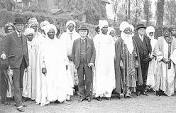 To many Nigerians, the profligate merry-making appears all the more callous and insensitive as it came few days after Boko Haram partisans massacred 48 students at the Federal Government College in Buni Yadi, Yobe state.
To many Nigerians, the profligate merry-making appears all the more callous and insensitive as it came few days after Boko Haram partisans massacred 48 students at the Federal Government College in Buni Yadi, Yobe state.
How could a government, a democratic one to boot, be partying at a time of such great national calamity is a question many Nigerians rightly asked.
The killings at Buni Yadi brought the number of people killed by Boko Haram, to close to three hundred since the beginning of January this year.
Little wonder then that many Nigerians, including prominent figures, vociferated loudly against the party.
Listen to Professor Wole Soyinka: “I would have preferred that the entire day of infamy be ignored altogether. I’m even thinking favourably of just ignoring the obscenity, then turning up at the counter-event.”
Former Vice President Atiku Abubakar railed: “Jonathan ought to have been sober in view of the recent killings of about 59 secondary school students on Tuesday, in Yobe state, and other recent attacks by the Boko Haram sect. I’m appalled by this obscenity showing on NTA, in the name of ‘Centenary Celebration.’ It is inappropriate! It is even obscene. I’m proud of our history over the last 100 years. I congratulate our President, and (all) Nigerians for this journey so far. However, I totally denounce the party currently taking place in Abuja. It is a symbolic dance on the graves of those murdered Federal Government College children. It’s also a slap on the faces of those Federal Government College parents currently mourning their children, and those crying over their abducted children.”
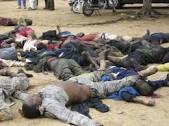 To former minister of Petroleum Resources, Professor Tam David-West, the country has nothing to celebrate. He fumed: “There is nothing to celebrate. Nigeria amalgamation is a mistake. From 1914 till today, Nigeria cannot showcase any tangible achievement. We are yet to get a nation because we don’t love ourselves. We are still living with ethnic sentiment. We still have divisions along ethnic and religious lines, which are now worse under President Goodluck Jonathan. So far, it has been 100years of motion without movement. So, what are we celebrating? If we are a serious set of people, the celebration should be used for deep reflection on where do we go from here?”
To former minister of Petroleum Resources, Professor Tam David-West, the country has nothing to celebrate. He fumed: “There is nothing to celebrate. Nigeria amalgamation is a mistake. From 1914 till today, Nigeria cannot showcase any tangible achievement. We are yet to get a nation because we don’t love ourselves. We are still living with ethnic sentiment. We still have divisions along ethnic and religious lines, which are now worse under President Goodluck Jonathan. So far, it has been 100years of motion without movement. So, what are we celebrating? If we are a serious set of people, the celebration should be used for deep reflection on where do we go from here?”
As for Chief Fred Agbaje, a constitutional lawyer, the union was a wasted alliance. To him: “Whatever was the reason for the amalgamation and the intention, looking in retrospection, the amalgamation is the beginning of the problem of Nigeria. It was a criminal amalgamation for the selfish British economic and political reasons. The amalgamation put the political administration of Nigeria in the hands of some people instead of an equitable distribution of power. So, it has been 100 years of wasted alliance; wasting, in the sense that it has retarded the growth of some section of the country. In terms of law and legislation, most of the laws that were imposed on us as at 1914 were laws that were diametrically opposed to our cultural, political and socio-economic situation. There is no prospect unless through a national conference where those anomalies imposed on us by Lord Lugard can be addressed.”
Another lawyer, Chief Fred Agbeyegbe, went even further as he questioned the legitimacy of the Nigerian state; He declared: “Nigeria ceased to exist yesterday December 31, 2013, based on the principle of amalgamation treaty. Nigeria was amalgamated in 1914 by treaty. In international law, any treaty that is not dated expires after 100 years, and invariably marks the end of the country as it ceases to be legal entity.”
To many Nigerians, the money splashed on the celebration should have been used to improve security which, for most citizens, has become the number one headache. Moreso since there appear to be a surge in the Boko Haram insurgency.
Nigerians were scandalized when it was reported that Nigerian troops ran away at the heat of battle, for the reason that the insurgents were better armed.
Nigerian troops had excelled in Peace-Keeping Missions abroad – from Congo to Liberia to Sierra Leone, and the nation spend a third of its budget on defence. It was, therefore, not a funny matter when troops abandoned posts, fled and complained of inadequate equipment and lack of insurance coverage.
The gruesome killings of sleeping students at Buni Yadi particularly shocked citizens who appeared to have reconciled themselves to the almost daily suicide-bombings.
Despite official claims last year to have broken the back of the insurgents, including one by the head of the Nigerian State Security Service, Boko Haram has upped the ante in the sheer brutality, the frequencies and the number of people killed in its attacks.
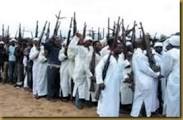 Nigerians remember that just last year, on September 16, 2013 to be precise, the Punch newspaper reported the Director-General of the agency, Ekpenyong Ita, as saying: “We can confidently say that we have decimated the terrorists’ top and middle level leadership and its foot soldiers thereby dislodging its centre of gravity. There is no doubt that our strategies have invariably affected the cohesion of the group as well as the chain of command, to the level that the group, for now does not possess the capacity to direct and launch simultaneous attacks on several cities or targets in Nigeria as had been the situation in the past two years.
Nigerians remember that just last year, on September 16, 2013 to be precise, the Punch newspaper reported the Director-General of the agency, Ekpenyong Ita, as saying: “We can confidently say that we have decimated the terrorists’ top and middle level leadership and its foot soldiers thereby dislodging its centre of gravity. There is no doubt that our strategies have invariably affected the cohesion of the group as well as the chain of command, to the level that the group, for now does not possess the capacity to direct and launch simultaneous attacks on several cities or targets in Nigeria as had been the situation in the past two years.
“We intend to build and consolidate on our successes in this war against the terrorists in order to create a conducive environment for democracy and development.”
http://www.punchng.com/news/terrorists-cant-carry-out-coordinated-attacks-again-sss/
The Nigerian Army Spokesman, Lt-Col Sagir Musa, also told the nation several times that they were winning the war.
So, Nigerians rightly ask whether, with all the official proclamations about the liquidation of Boko Haram, and with the killings and bombings intensifying, it is the ghosts of Boko Haram that is causing all the mayhem.
Founded in 2002, the initial announced aim of the sect was opposition to western values, including western-styled education. Hence the name, Boko Haram, which is a Hausa phrase that means, “Western education is forbidden.”
But today, no one knows what the organisation is fighting for and why it is so indiscriminate in its attacks. Unlike other insurgents groups, Boko Haram leaders remain faceless.
When in 2009, the group began low-intensity military operations, the Nigerian military replied swiftly with massive counter-measures. Boko Haram founding leader, Mohammed Yusuf, was captured and killed in mysterious circumstances while in Nigerian police custody.
 That was among the many mistakes the Nigerian military made. Rather than keep Mohammed Yusuf alive and gather vital intelligence, the military establishment, buoyed by insane sense of triumphalism, stupidly killed him.
That was among the many mistakes the Nigerian military made. Rather than keep Mohammed Yusuf alive and gather vital intelligence, the military establishment, buoyed by insane sense of triumphalism, stupidly killed him.
Other blunders committed include visiting wanton violence on the local populace, thereby alienating people who could have provided critical intelligence.
Modern Nigeria came into being on January 1, 1914, when the Colonial Governor of the Territories of Northern and Southern Nigeria, Frederick Lugard, decided to amalgamate the two protectorates to form a colony of the British Empire.
The name ‘Nigeria’ was said to have been suggested by Lugard’s concubine, Flora Louisa Shaw.
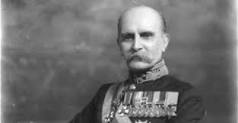 Only cold colonial calculations impelled the union as it defied defied common sense, logic, geography and history.
Only cold colonial calculations impelled the union as it defied defied common sense, logic, geography and history.
The birth of the nation was made all the more problematic as the colonial midwives did not complete their job in 1960, when they handed power over to local politicians.
Forty-six years is too short a time to build a nation from a disparate group of independent states, but irresistible clamour for independence by nationalists, and the exhaustion of Her Majesty’s government by the war with Nazi Germany, compelled the British to hastily grant independence to the nascent state.
Documents released by ex-colonial officials (some of them published in NA) suggested that the British deliberately left enough explosive mines scattered around the land, to ensure that it was only a question of time before things blew up.
It did so spectacularly in 1967 when the aggrieved Igbos of Eastern Nigeria launched an abortive secession bid. The three-year civil war that ensued reportedly claimed a million lives.
Geography and history conspired to make Nigeria a very difficult nation to rule.
The Rivers Niger and Benue appear to provide natural demarcations.
Historically, the territories cobbled together to form Nigeria harboured some of Pre-colonial Africa strongest states (Bornu and Oyo Empires, Benin Kingdom are a few of them) with fierce independence dispositions.
Even at the beginning, two founding fathers of the nation expressed serious misgivings about their nation. The late powerful Sardauna of Sokoto, Sir Ahmadu Bello, called the amalgamation the “Mistake of 1914.” To the former premier of Western Nigeria, Obafemi Awolowo, Nigeria was “a mere geographic expression.”
 Former Nigerian Attorney General and Minister of Justice, Richard Akinjide (both a QC and a SAN (Senior Advocate of Nigeria) and one that belongs to the inner circle of Nigeria’s elite), went further in a blistering and explosive article with the mind-boggling title, ‘The Amalgamation of Nigeria Was a Fraud.’
Former Nigerian Attorney General and Minister of Justice, Richard Akinjide (both a QC and a SAN (Senior Advocate of Nigeria) and one that belongs to the inner circle of Nigeria’s elite), went further in a blistering and explosive article with the mind-boggling title, ‘The Amalgamation of Nigeria Was a Fraud.’
The article is so astute that it should be quoted at length: “Our problems did not start yesterday. It started about 1884. Lord Lugard came here about 1894 and many people did not know that Major Lugard was not originally employed by the British Government. He was employed by companies. He was first employed by East Indian Company, by the Royal East African Company and then by the Royal Niger Company. It was from the Royal Niger Company that he transferred to the British government. Unless you know this background, you will not know the root causes of our problems. The interest of the Europeans in Africa and indeed Nigeria was economic and it’s still economic. They have no permanent friends and no permanent interests. Neither their interests nor their friends are permanent.
“Nigeria was created as British sphere of interests for business. In 1898, Lugard formed the West African Frontier Force initially with 2,000 soldiers and that was the beginning of our problems.
Anybody who wants to know the root cause of all the coups and our present problems, and who does not know the evolution Nigeria would just be looking at the matter superficially. Our problems started from that time. And Lugard was what they called at that time imperialist. A number of British soldiers, businessmen, politicians were very patriotic. But I must warn you; they were operating in the interest of their country. Lugard became a Lord. Nigerians, too, should operate in the interest of their country. When Lugard formed the West African Frontier Force with 2,000 troops, about 90 percent of them were from the North mainly from the Middle belt. And his dispatches to London between that time and January 1914 are extremely interesting. Lugard came here for a purpose and that purpose was British interest. Between 1898 and 1914, he sent a number of dispatches to London which led to the Amalgamation of 1914. The Order – in – Council was drawn up in November 1913 signed and came into force in January 1914. In those dispatches, Lugard said a number of things, which are at the root causes of yesterday and today’s problems. The British needed the Railway from the North to the Coast in the interest of British business. Amalgamation of the South (not of the people) became of crucial importance to British business interest. He said the North and the South should be amalgamated. Southern Nigeria came into existence on January 1900.
“So when Benin was conquered in 1896, it made the creation of the Southern Nigerian protectorate possible on January 1, 1900. If you remember, Sokoto was not conquered until 1903. So, there was no question of Nigeria at that time. After the conquest of Sokoto, they were able to create the northern Nigerian protectorate. Lugard went full blast and created what was to be known as the protectorate of Northern Nigeria. What is critical and important are the reasons Lugard gave in his dispatches.
“They are as follows: He said the North is poor and they have no resources to run the protectorate of the North. That they have no access to the sea; that the South has resources and have educated people. The first Yoruba lawyer was called to the Bar in 1861. Therefore, because it was not the policy of the British Government to bring the taxpayers money to run the protectorate, it was in the interest of the British business and the British taxpayer that there should be Amalgamation. But what the British amalgamated was the Administration of the North and South and not the people of the North and the South. That is one of the root causes of the problems of Nigeria and the Nigerians.
“When the amalgamation took effect, the British government sealed off the South from the North. And between 1914 and 1960, that’s a period of 46 years, the British allowed minimum contact between the North and South because it was not in the British interest that the North be allowed to be polluted by the educated South. That was the basis on which we got our independence in 1960. When the North formed a political party, the northern leaders called it Northern Peoples Congress (NPC). They didn’t call it Nigeria Peoples Congress. That was in accordance with the dictum and policies of Lugard. When Aminu Kano formed his own party, it was called Northern Elements Progressive Union (NEPU) not Nigerian Progressive Union.
“It was only Awolowo and Zik who were mistaken that there was anything called Nigeria. Infact, the so-called Nigeria created in 1914 was a complete fraud. It was created not in the interest of Nigeria or Nigerians but in the interest of the British. And what were the structures created? The structures created were as follows: Northern Nigeria was to represent England; Western Nigeria like Wales; Eastern Nigeria was to be like Scotland. In the British structure, England has permanent majority in the House of Commons. There was no way Wales can ever dominate England, neither can Scotland dominate Britain. But they are very shrewd. They would allow a Scottish man to become Prime Minister. They would allow a Welsh man to become Prime Minister in London but the fact remains that the actual power rested in England.
“That was what Lugard created in Nigeria, a permanent majority for the North. The population figure of the North is also a fraud. Infact, a British Colonial Civil Servant who was involved in the fraud was trying to expose it but he was never allowed to publish it. The analysis is as follows: If you look at the map of West Africa, starting from Mauritania to Cameroun and take a population of each country as you move from the coast to the Savannah, the population decreases.
“Or conversely, as you come from the Desert to the Coast, right from Mauritania to the Cameroun, the population increases. The only exception throughout that zone is Nigeria. Nigeria is the only zone whereby you go from coast to the North, the population increases and you come from the North to the Coast, the population decreases. Well, geographers, anthropologists and population experts, draw your conclusions.”
Those that attempt to understand the current problems plaguing Nigeria will do well to study its history.
The baffling inability of Nigerians to build a strong, viable and prosperous nation will not make sense until one understands the dynamics that made things so difficult.
The structures (or lack of it) that the colonialists put in place made the current crises almost inevitable.
This, however, does not in any way excuse the mind-boggling and insane corruption of the country’s elite.
To begin with, it was never in the interests of colonialists to create harmony in the conquered territories– that will simply defeat the logic of imperialism, which requires a divide and rule policy for sustenance.
Nothing in Lugard’s life story suggested a lost-love for Africans. He was a blood-thirsty arch-colonialists who was frequently called upon to pacify ‘local agitators’ in the interests of British Imperialism.
He was simply a mercenary at the service of empire-builders.
It was Lugards expertise of massive killings of locals from India to in Southern Africa that recommended him to the British colonial interests in Nigeria.
That Lugard was a rabid racist was never in doubt. This is what the founder of Nigeria had to say about the African: “In character and temperament, the typical African of this race-type is a happy, thriftless, excitable person. Lacking in self-control, discipline, and foresight. Naturally courageous, and naturally courteous and polite, full of personal vanity, with little sense of veracity, fond of music and loving weapons as an oriental loves jewellery. His thoughts are concentrated on the events and feelings of the moment, and he suffers little from the apprehension for the future, or grief for the past. His mind is far nearer to the animal world than that of the European or Asiatic, and exhibits something of the animals’ placidity and want of desire to rise beyond the State he has reached. Through the ages the African appears to have evolved no organized religious creed, and though some tribes appear to believe in a deity, the religious sense seldom rises above pantheistic animalism and seems more often to take the form of a vague dread of the supernatural”
“He lacks the power of organization, and is conspicuously deficient in the management and control alike of men or business. He loves the display of power, but fails to realize its responsibility ….he will work hard with a less incentive than most races. He has the courage of the fighting animal, an instinct rather than a moral virtue…… In brief, the virtues and defects of this race-type are those of attractive children, whose confidence when it is won is given ungrudgingly as to an older and wiser superior and without envy…….Perhaps the two traits which have impressed me as those most characteristic of the African native are his lack of apprehension and his lack of ability to visualize the future.”
Yet, at the expensive celebrations, the rulers of Nigeria awarded Lugard and his wife posthumous awards!
The gargantuan and wanton fest was not the only thing that vexed Nigerians, the decision to award 100 people national honours generated enough controversy of its own, as many prominent Nigerians rejected it.
Whoever compiled the Honour List did the country a great disservice.
Incredibly, the list lumped illustrious names like Fela, Gani Fawehinmi with such utterly despicable cretins like Lugard and, please don’t gasp, Sani Abacha.
How anyone could even dream of honouring the goggled ogre that terrorized the country in a five-year reign of sheer terror, is a question that left Nigerians perplexed?
Little wonder Nobel Laureate Wole Soyinka was acerbic in his rejection: Such abandonment of moral rigour comes full circle sooner or later. The survivors of a plague known as Boko Haram, students in a place of enlightenment and moral instruction, are taken to a place of healing dedicated to an individual contagion – a murderer and thief of no redeeming quality known as Sani Abacha, one whose plunder is still being pursued all over the world and recovered piecemeal by international consortiums – at the behest of this same government which sees fit to place him on the nation’s Roll of Honour! I can think of nothing more grotesque and derisive of the lifetime struggle of several on this list, and their selfless services to humanity. It all fits. In this nation of portent readers, the coincidence should not be too difficult to decipher.
I reject my share of this national insult.”
The families of Fela Anikulapo, MKO Abiola, Gani Fawehinmi were among those that also rejected the awards bestowed on their noted sons.
Although it had its numerous critics, many Nigerians and foreigners felt that the country had a need to celebrate.
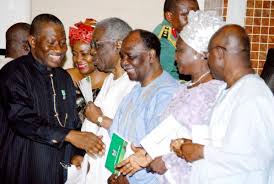 The organizers of the celebrations released a “Concept Document” which outlines the major events that will anchor the celebrations. In it, they boasted: “Nigeria is a beautiful mosaic with a national identity defined by its history and contemporary culture. The arts are fundamental to our existence drawing out the nation’s soul for the world to see. Our commitment to transform Nigeria will be strengthened by a new understanding of our history, the visions of our founding fathers, our collective achievements and the promise of the nation of our dreams.”
The organizers of the celebrations released a “Concept Document” which outlines the major events that will anchor the celebrations. In it, they boasted: “Nigeria is a beautiful mosaic with a national identity defined by its history and contemporary culture. The arts are fundamental to our existence drawing out the nation’s soul for the world to see. Our commitment to transform Nigeria will be strengthened by a new understanding of our history, the visions of our founding fathers, our collective achievements and the promise of the nation of our dreams.”
Nigeria’s last military ruler, General Abdulsalam Abubakar, said the celebrations was necessary as: “It should be a time to rebrand, rejuvenate and pursue the true ideals for Nigeria.”
On the need for a centenary celebration, the Secretary to the Government of the Federation, Senator Anyim Pius Anyim, waxed eloquent: “On January 1, 1914, the Northern and Southern Protectorates were formally amalgamated into one country, establishing modern day Nigeria. January 1, 2014 marks one hundred years of our union as a nation. There are not many nations privileged to have such longevity.
Notwithstanding our struggles and challenges, this is an epoch deserving of a celebration by the Nigerian people. It offers us a unique opportunity to focus on our country, its history, people, achievements and aspirations for the next century.
We do not take our nationhood for granted. There is, however, an advantage in being a melting pot of cultures, of multiple ethnic nationalities and different religions, brought together in a united and viral entity.
Our story is one of admirable and remarkable progress. Nigeria attained independence, fought and survived a civil war and is currently committed to building a stable nation, with a strong economy.
We are blessed with a vibrant population and our democracy is maturing. This centenary celebration presents us an opportunity to count our blessings as a nation, celebrate our dexterity and resilience as a people and resolve to launch into the next century with renewed determination, hope and expectations.”
On his part, the president, Goodluck Jonathan, in a 46 point address was full of admiration and hope for his country: “One hundred years ago, on the 1st of January 1914, the British Colonial authorities amalgamated the Southern and Northern Protectorates, giving birth to the single geo-political entity called Nigeria which has become our home, our hope, and our heritage…
We are a nation of the future, not of the past and while we may have travelled for a century, we are not yet at our destination of greatness…
In challenging times, it is easy to become pessimistic and cynical. But hope, when grounded in realism, enables and inspires progress. Therefore, as we celebrate our first century of nationhood and enter a second, we must not lose sight of all that we have achieved since 1914 in terms of nation-building, development and progress…
We are a unique country. We have been brought together in a union like no other by providence…
The whole world awaits this African success story. With our sheer size, population, history, resilience, human and natural resources and economic potentials, Nigeria is divinely ordained to lead the African Renaissance…”
French President Francois Hollande, South Africa’s Deputy President Kgalema Motlanthe and many other heads of states and governments were among the world leaders who attended the celebrations.
Many of them lauded Nigeria for the role it played in the maintenance of world peace and harmony.
Nice speeches, but Nigerians would rather that their officials do their jobs properly, rather than resort to hugging media limelight, and organizing parties at a time of national mourning.
They would rather that their rulers spend more time solving the country’s myriads of problem than in self-congratulatory celebrations and partying.
About the Author
Femi Akomolafe is a passionate Pan-Africanist. A columnist for the Accra-based Daily Dispatch newspaper and Correspondent for the New African magazine. Femi lives in both Europe and Africa, and writes regularly on Africa-related issues for various newspapers and magazines.
Femi was the producer of the FOCUS ON AFRICANS TV Interview programme for the MultiTV Station.
He is also the CEO of Alaye Dot Biz Limited Dot Biz, a Kasoa-based Multimedia organisation that specialises in Audio and Video Production. He loves to shoot and edit video documentaries.
His highly-acclaimed books (“Africa: Destroyed by the gods,” “Africa: It shall be well,” “18 African Fables & Moonlight Stories” and “Ghana: Basic Facts + More”) are now available for sales at the following bookshops/offices:
- Freedom Bookshop, near Apollo Theatre, Accra.
- The Daily Dispatch Office, Labone – Accra
- WEB Dubois Pan-African Centre, Accra
- Ghana Writers Association office, PAWA House, Roman Ridge, Accra.
- African Kitchen in Amsterdam Bijlmer
Where to buy them online:
On Lulu Books:
18 African Fables & Moonlight Stories https://goo.gl/Skohtn
Ghana: Basic Facts + More: https://goo.gl/73ni99
Africa: Destroyed by the gods: https://goo.gl/HHmFfr
Africa: It shall be well: https://goo.gl/KIMcIm
Africa: it shall be well
on Kindle books: https://www.createspace.com/4820404
on Amazon books: http://goo.gl/QeFxbl
on Lulu Books: https://goo.gl/SQeoKD
Africa: Destroyed by the gods
on Kindle books: https://www.createspace.com/4811974
on Amazon books: http://goo.gl/1z97ND
on Lulu Books: http://goo.gl/KIMcIm
My Lulu Books page: http://www.lulu.com/spotlight/FemiAkomolafe
Get free promotional materials here:
- Africa: it shall be well: http://alaye.biz/africa-it-shall-be-well-introduction-in-pdf/
A FREE Chapter of ‘Africa: It shall be well’ could be downloaded here: http://alaye.biz/africa-it-shall-be-well-a-free-chapter/
- Africa: Destroyed by the gods (How religiosity destroyed Africa) http://alaye.biz/africa-destroyed-by-the-gods-introduction/
A FREE Chapter of ‘Africa: Destroyed by the gods’ could be downloaded here: http://alaye.biz/africa-destroyed-by-the-gods-free-chapter/
Contact Femi:
Femi’s Blog: www.alaye.biz/category/blog
Website: www.alaye.biz
Femi on Amazon https://www.amazon.com/author/femiakomolafe
Twitter: www.twitter.com/ekitiparapo
Facebook:https://www.facebook.com/alayeclearsound;
Gmail+: https://plus.google.com/112798710915807967908;
LinkedIn: www.linkedin.com/in/femiakomolafe
Email: fakomolafe@gmail.com
Kindly help me share the books’ links with your friends and, grin, please purchase your copies.
Comradely,
Femi Akomolafe



